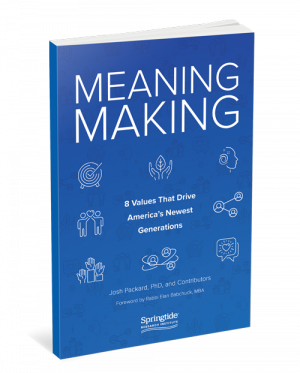
Growthful: Self-Improvement & Safety Nets
Below is an excerpt from Meaning Making: 8 Values that Drive America’s Newest Generations. Follow along on the blog for more excerpts, check out the additional resources on our Meaning Making page, and buy the book here.
One of the simplest aspects of growing is through learning and being stretched outside a person’s comfort zone. This aspect of growth is rooted in a desire to keep expanding and becoming, both for the sake of self-improvement and also to avoid falling behind in a rapidly changing world.
Young people want to continually expand their sense of self and their sets of skills. With more than one-third of young people telling us they think it’s very important to develop their minds, bodies, and spirits, it’s increasingly necessary that organizations find ways to provide such opportunities. The Awake Youth Project, a mindfulness and meditation program that partners with local high schools in Brooklyn, New York, does just that.
“Inspired by the practice of mindfulness and its unwavering ability to awaken the mind towards liberation, peace and healing, Awake Youth Project (AYP) was created to offer a resting place, a space of transformation for Brooklyn’s teens” the mission statement on their website reads. “Through our programming youth receive tools that aim to bolster their full potential in becoming more aware and deeply connected to their authentic selves.” Authenticity, self-awareness, and growth toward total fullness: all critical aspects of practicing the value of being growthful.
AYP provides after-school drop-in meditation time, internships, professional development, and retreats. They also provide peer leadership training, which “teaches, supports and mentors a small, motivated group of teens and young adults (ages 15–21) in a 5-month intensive practice and exploration of mindfulness and meditation tools for everyday living, health and well-being.” Testimonials on the AYP website make it clear that this kind of self-work has repercussions for young people’s whole selves and whole lives.
“Learning how to understand how my emotions take place within my body has given me the chance to be with my mind and body in better harmony,” writes Armani, a young woman involved in the program. A young man, Richardson, says, “Before I started meditating, I would be overcome with anger and frustration quickly. Now, I have the chance to make a choice about how I react to my life and environment.”
The skills these young people are acquiring are not just about self-improvement, but instances of a broader social outreach to an underserved, “under-acknowledged” community in the Bronx. The project’s website cites studies that show the value of mindfulness intervention and notes that these “interventions reduce feelings of distress, anxiety and depression in addition to addressing other public health challenges facing our youth in under-acknowledged neighborhoods.” AYP is the kind of program that demonstrates the way being growthful is a value of self-improvement both for its own sake and for the sake of preparing young people to face and overcome life’s inevitable obstacles.
This principle is illumined by AYP, but it can be embodied by all types of organizations. Any group that hopes to have young people as members can and should adopt practices that facilitate growth. Synagogues, schools, companies, and communities of all types have skill-building opportunities and perspectives to offer young people that can impact their whole lives, even outside the formal boundaries of those institutional walls or set gatherings.
Act on the Data: Think about the “life skills” your organization can help young people develop, even if it’s not formally part of what you do. How can you offer these skills or perspectives to young people in a way that both encourages self-improvement and helps prepare them for the ups and downs of the real world?




